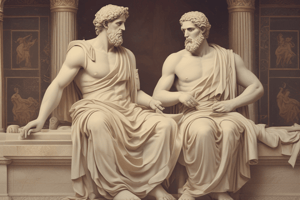Podcast
Questions and Answers
In which century BC was the Iliad composed?
In which century BC was the Iliad composed?
- 6th or 5th
- 4th or 3rd
- 8th or 7th (correct)
- 9th or 10th
What is the central theme of the Iliad?
What is the central theme of the Iliad?
- The importance of friendship
- The struggle for independence
- The wrath of Achilles (correct)
- The power of love
Who is the king of the gods in the Iliad?
Who is the king of the gods in the Iliad?
- Poseidon
- Athena
- Hades
- Zeus (correct)
What is the name of the poet attributed to the Iliad?
What is the name of the poet attributed to the Iliad?
What is the literary form of the Iliad?
What is the literary form of the Iliad?
What is the significance of the Iliad in the Western literary tradition?
What is the significance of the Iliad in the Western literary tradition?
Flashcards are hidden until you start studying
Study Notes
Composition and Historical Context
- Composed around 8th or 7th century BC
- Ancient Greek epic poem attributed to Homer
- Part of the Epic Cycle, which tells the story of the Trojan War and its aftermath
Plot Overview
- Tells the story of the Trojan War, a ten-year conflict between the city-states of Troy and Greece
- Focuses on the wrath of Achilles, the greatest Greek warrior
- Events take place in the final year of the war
- Achilles' anger is sparked by his commander, Agamemnon, who takes Achilles' war prize, Briseis
Main Characters
- Achilles: Greatest Greek warrior, central character of the Iliad
- Agamemnon: King of Mycenae, commander of the Greek army
- Hector: Prince of Troy, greatest Trojan warrior
- Odysseus: King of Ithaca, clever and cunning Greek warrior
- Zeus: King of the gods, often intervenes in the mortal conflict
Themes
- Honor and glory: Achilles' desire for recognition and respect
- Wrath and anger: Achilles' rage and its consequences
- Fate and destiny: The inevitability of the characters' outcomes
- Humanity and mortality: The suffering and loss of war
Style and Structure
- Written in dactylic hexameter, a traditional form of Greek poetry
- Divided into 24 books, each focusing on a specific episode or event
- Rich in imagery, similes, and epithets, which create a vivid and epic feel
Impact and Legacy
- One of the most influential works in the Western literary tradition
- Shaped the development of Greek tragedy and literature
- Inspired countless adaptations, translations, and reinterpretations throughout history
Composition and Historical Context
- Composed around 8th or 7th century BC, making it an ancient Greek epic poem
- Attributed to Homer, a renowned ancient Greek poet
- Part of the Epic Cycle, which narrates the story of the Trojan War and its aftermath
Plot Overview
- Tells the story of the ten-year Trojan War between Troy and Greece
- Focuses on the wrath of Achilles, the greatest Greek warrior, in the final year of the war
- Achilles' anger is triggered by Agamemnon, who takes his war prize, Briseis
Main Characters
- Achilles: Central character, greatest Greek warrior, known for his bravery and strength
- Agamemnon: King of Mycenae, commander of the Greek army, and Achilles' commander
- Hector: Prince of Troy, greatest Trojan warrior, and a symbol of Trojan valor
- Odysseus: King of Ithaca, cunning and clever Greek warrior, known for his strategy
- Zeus: King of the gods, frequently intervenes in the mortal conflict, influencing the war's outcome
Themes
- Honor and glory: Achilles' desire for recognition and respect drives the plot
- Wrath and anger: Achilles' rage has devastating consequences for both Greeks and Trojans
- Fate and destiny: The characters' outcomes are inevitable, highlighting the power of fate
- Humanity and mortality: The Iliad portrays the suffering and loss of war, emphasizing human vulnerability
Style and Structure
- Written in dactylic hexameter, a traditional Greek poetic form
- Divided into 24 books, each focusing on a specific episode or event of the war
- Rich in imagery, similes, and epithets, creating a vivid and epic atmosphere
Impact and Legacy
- One of the most influential works in Western literature, shaping literary traditions
- Inspired the development of Greek tragedy and literature
- Countless adaptations, translations, and reinterpretations throughout history, cementing its legacy
Studying That Suits You
Use AI to generate personalized quizzes and flashcards to suit your learning preferences.




